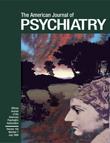Personality Ratings of Depressed Outpatients
To the Editor: I would like to take issue with the conclusion of the article by R. Michael Bagby, Ph.D., and colleagues (1). The authors conclude that “depressed mood may not influence the self-report of personality traits.” Because they did not measure patients before and after improvement from depression, their design was cross-sectional. As such, it is inadequate for making conclusions about personality measures over time at different levels of depression. This would ideally require longitudinal findings or at least measures on two similar populations that differ by state of depression.
They do cite an article that used a sound longitudinal design to address this question (Hirschfeld et al., 1983) but do not report its empirical findings. This well-designed longitudinal study indicated that depression significantly changes self-report personality findings. There are other reports that indicate a higher level of personality trait measurement from both anxiety and depression (2, 3) and that aspects of these changed measures may have clinical significance (4). (It appears that personality pathology measured when personality traits are exaggerated by state effects may still be predictive, of course.)
Dr. Bagby and colleagues report that informants’ ratings of personality indicate that the informants think that the patients, when more depressed, have more neuroticism, less extraversion, and other personality changes. Their findings are consistent with the hypothesis of higher levels of measured personality pathology with higher states of depression. This finding is different from their conclusions.
Finally, the authors reported on only one instrument. Their conclusion should be that cross-sectional data on the NEO Personality Inventory indicate good cross-sectional correlation between patients’ and informants’ ratings. This would be an appropriate conclusion to their interesting report.
1. Bagby RM, Rector NA, Bindseil K, Dickens SE, Levitan RD, Kennedy SH: Self-report ratings and informants’ ratings of personalities of depressed outpatients. Am J Psychiatry 1998; 155:437–438Link, Google Scholar
2. Reich J, Noyes R Jr, Hirschfeld R, Coryell W, O’Gorman T: State and personality in depressed and panic patients. Am J Psychiatry 1987; 144:181–187Link, Google Scholar
3. Reich J: State versus trait in mental disorders (letter). Am J Psychiatry 1989; 146:568–569Link, Google Scholar
4. Reich J, Vasile R: The effect of personality disorders on the treatment outcome of axis I conditions: an update. J Nerv Ment Dis 1993; 181:475–484Crossref, Medline, Google Scholar



